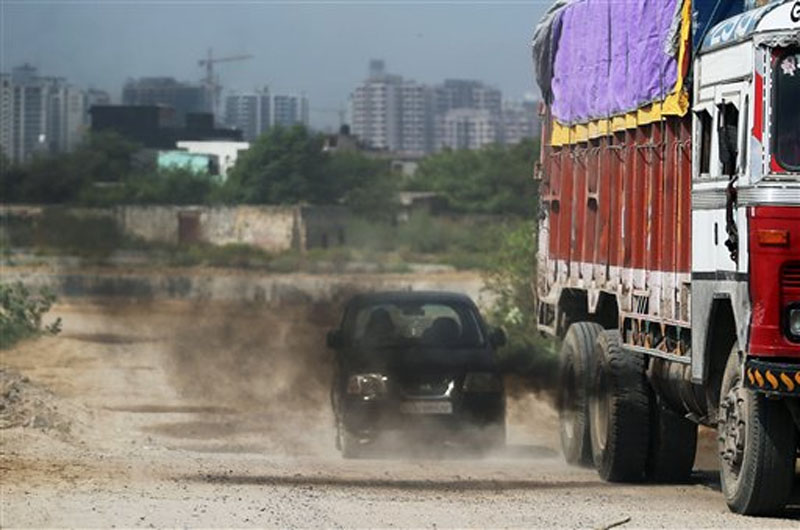India vows to cut carbon intensity in Paris pledge
NEW DELHI: As the last major economy to submit a target for a global climate pact, India is pledging to reduce the intensity of its carbon emissions and boost the share of electricity produced from sources other than fossil fuels to 40 percent by 2030.
The world's third-largest carbon polluter filed its climate action plan to the Germany-based UN climate secretariat late Thursday, the deadline for pledges before a December conference in Paris where governments are supposed to adopt a landmark deal to fight climate change.
In a 38-page submission citing the country's forefather Mohandas K. Gandhi, an ardent environmentalist, the Indian government said it would slash the rate of emissions relative to gross domestic product by 33-35 percent by 2030 from 2005 levels. Already, the country has reduced its carbon intensity by 12 percent since 2005, it said.
Environment Minister Prakash Javadekar said India held its submission back so it could coordinate its filing with the Indian holiday celebrating Gandhi's birthday on Friday.
"Our every action will be cleaner than what it was earlier," Javadekar told reporters, insisting that Indian traditions and culture are already "at one with nature."
The carbon intensity goal will allow India's emissions to grow as its economy expands, but at a lower rate than now.
"It is estimated that more than half of India of 2030 is yet to be built," the government said. Prime Minister Narendra Modi has made manufacturing and job creation a key promise of his administration, and has implored foreign companies and governments, with the slogan "Make in India," to help.
Environmental groups following the UN climate talks welcomed India's pledge.
"India now has positioned itself as a global leader in clean energy, and is poised to play an active and influential role in the international climate negotiations this December," said Rhea Suh, president of the Natural Resources Defense Council, a group based in New York.
Climate analyst Samir Saran at the Observer Research Foundation, a New Delhi think tank, also described India's targets as ambitious and "rooted in Indian reality," given the fact that at least 300 million citizens — a fourth of the population — still have no access to electricity at all, while hundreds of millions more make do with just a few hours a day.
India also promised aggressive reforestation efforts, with enough new trees to absorb up to 3 billion tons of carbon dioxide by 2030, and laid out plans for adapting to changing weather and temperatures.
"This is a positive and novel Indian approach," Saran said, adding that India was effectively sharing responsibility for taking action to protect the climate while seeking global partnerships on implementing those plans.
India plans a fivefold boost in renewable energy capacity in the next five years to 175 gigawatts, including solar power, wind, biomass and small hydropower dams.
Even with a major boost in renewable energy, India is also planning to expand coal power — the biggest source of emissions — to satisfy its energy needs. Coal-fired power plants account for about 60 percent of India's installed power capacity.
By 2030, the government said its installed capacity from "non-fossil fuel-based energy resources" would grow to 40 percent. It was not immediately clear whether that would also include nuclear power.
India said boosting its renewables to that level would require help with transfer of clean technology and financing — two of the crunch issues before the Paris deal, which is supposed to apply to all countries but also include provisions for rich countries to help poor countries fight climate change and adapt to its consequences.
Scientists say the heat-trapping carbon emissions released by the burning of fossil fuels — coal, oil and gas — are a key driver of rising temperatures that could lead to potentially catastrophic impacts, including flooding of island nations and intensifying droughts.
China and the US are the only countries with higher emissions than India. As a bloc, the 28-nation European Union's emissions are also higher.
Like other developed countries, the US and the EU committed to absolute reduction targets, while China pledged that its emissions would stop growing by 2030. India, with hundreds of millions still living in poverty, wasn't expected to offer a peak year because its emissions are projected to increase for decades as energy demand rises along with economic growth.
Javadekar said industrialised countries should be setting even more ambitious targets than what's been pledged so far.
"The developed world has polluted the world, but we will help even though we are suffering," he said.
Two climate research groups this week said the pledges put forth before the Paris conference would slow global warming but projected that temperatures would still rise by between 2.7 and 3.5 degrees C (4.9 and 6.3 degrees F).






